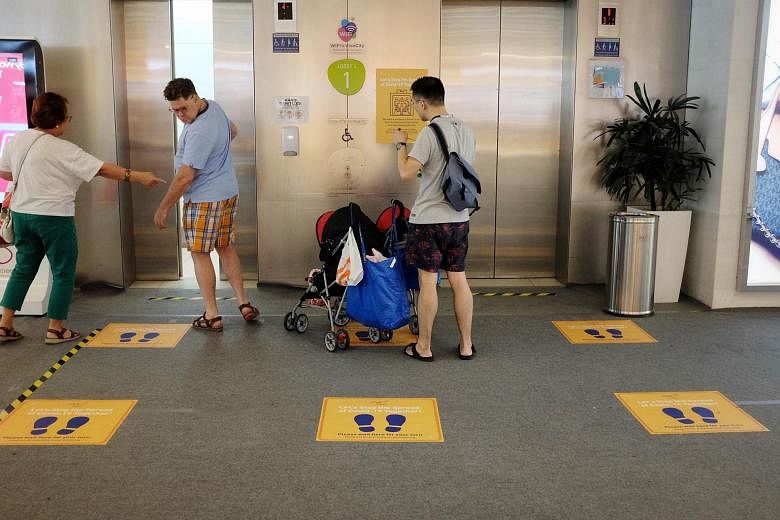SINGAPORE - Singapore announced another 47 new Covid-19 cases on Tuesday (March 31), but the briefing by the multi-ministry task force went beyond headline numbers.
Here are seven notable points brought up during the session that explain why Singapore is doing what it is doing, and which also indicate what the future holds for the country's efforts in battling the outbreak.
1. Chinese tourists could be allowed entry to Singapore
Minister for National Development Lawrence Wong said that if current rates of infection in China continue, Singapore could consider lifting travel restrictions for tourists from some cities, such as Beijing and Shanghai.
In recent days, the number of cases in China has plateaued, with almost all new cases imported by returning nationals. Sunday's figure of 31 new cases were all imported save one, and zero new local cases had been registered in several instances before that.
Mr Wong said that any changes to Singapore's travel restrictions will be based strictly on data and evidence, with the priority being to keep the country's borders safe.
2. No widespread community transmission
Singapore's top medical authority, Associate Professor Kenneth Mak, the director of medical services at the Ministry of Health, said local transmissions have occurred in a limited context that are traceable.
In response to a question on whether Singapore is close to widespread community transmission, he said the success of contact tracing so far has given the authorities confidence that they can continue to account for how the virus is spreading.
The virus is not spreading in a random and uncontrolled fashion, he said, and he believes many of the already established clusters are themselves linked.
3. Hotels for returnees on stay-home notice not an indulgence
Mr Wong said that providing dedicated facilities, including hotels, for returnees from the United States and Britain serving their 14-day stay-home notices is not an indulgence and certainly not unnecessary spending by the Government.
"It is a critical health measure," he said, noting that the Government would like to secure such an arrangement for all returnees but is still checking if there are enough beds.
"We will spend what is necessary to keep Singaporeans safe," he said.
4. No one has tested positive twice
Answering a question about Chinese patients reportedly testing positive for Covid-19 a second time after recovering, Prof Mak said this has so far not happened in Singapore.
He said that in some overseas cases, patients were discharged upon their symptoms clearing rather than only after ascertaining that they had shed the virus.
In Singapore, individuals are discharged after two consecutive negative results. Health authorities also do follow-ups and will summon patients back if required.
He said no patients have been called back so far.
5. Mask advisory, like all measures, under review
When asked if the Government is considering changing its advice that only those who feel unwell or come into close contact with patients wear masks, Prof Mak said this, like the effectiveness of safe distancing measures, is under review.
He said the recommendations will be made public after this round of review has been completed.
He added that the decision is based not just on evidence from other countries, but also literature and Singapore's own experience.
6. Antibody tests could be rolled out soon
Some countries have deployed antibody tests, which test if an individual has developed immunity to the virus, as part of their arsenal to battle the virus.
Prof Mak said these tests are being validated, but that they should be used in a different way from the polymerase chain reaction, or PCR, tests that doctors are using now.
For one thing, antibody tests have a limited role in diagnosis, as it takes the body at least four days after infection to product antibodies, which is too late for the purposes of quick detection and contact tracing.
However, they could be used to determine when a patient can be discharged, and guidelines will be issued to doctors here on how best to use them when the time comes.
7. What does success look like?
Mr Wong said that success in his book does not mean zero cases, but the stopping of further transmissions that present themselves as unlinked or new clusters.
He also warned that Singapore's borders remain porous as it is an international airhub, which means the possibility of new cases - and with that, new connected infections - remains high.












